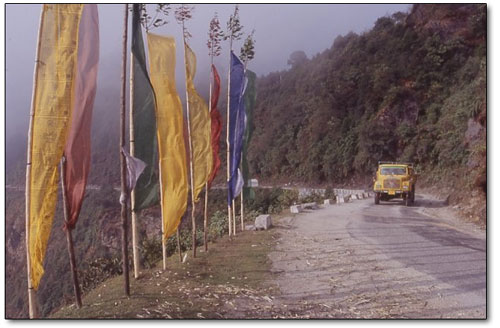| ||
Night hunting in Bhutan
by Chef Boy Ari It was almost dark, and we were almost to the pass, Pele la, when we rounded a corner and saw monkey sex in the road. We cheered. Then the road curved and crept under vines and waterfalls, past camps where Indian road workers melted blacktop over open fires and smashed big rocks into little rocks with sledgehammers. In the almost dark, it was spooky. The bus was silent as we crept upward into the cooling darkness. Ugyen #1 was working the gears with one hand and the steering wheel with the other. He turned the blower on, to combat the condensation that materialized with the falling outside temperature. Then he started mumbling what had to be a Buddhist mantra. I leaned in discreetly to whisper to Sangay, “Why is Ugyen #1 praying?” “He’s praying, la,” Sangay said. The word la, in addition to meaning “mountain pass” in Dzongkha, the language of Bhutan, is also added to the end of sentences to signal respect. “I know he’s praying, la,” I said. “Why?” If Sangay knew, he wasn’t saying. And now of course everybody was wondering what my hushed conversation with Sangay was about. Hoping to break the tension, I told the group a joke about a traveling Vaseline salesman. Finally we crested the pass, with a cheer for Ugyen #1, who smiled, kept driving and kept praying. Then he hit the brakes, coming to a halt as dark shapes emerged on the road. Two yaks in the headlights were staring at us. Then, as if arguing over us, they started butting heads. Ugyen #1 somehow found room enough on that narrow road to drive around them. Then we were descending into Bhutan’s Phobjika Valley, where the endangered black-necked cranes, who live in Tibet, spend the winter. We didn’t have to descend far, as Phobjika is a very high valley. After days of trekking the Himalayas and talking to farmers about Bhutan’s emerging organic agriculture program, we were going to spend a rare night indoors at a hotel, followed by a morning of bird watching. I was ready to take a shower, sleep in a bed and e-mail this column, my deadline for which had already passed. Our lead guide, Wangda Tobgyal of Lakhor Tours and Treks, said I could send it from Phobjika. But the phone lines were down in the valley. With no line to plug into my laptop, Flash couldn’t phone home. “Tomorrow in Trongsa you can send it, la,” Wangda promised as we wolfed down some ema-datse, the fiery Bhutanese combination of chilis and cheese. The next day we traveled back over Pele la and down a third side of the pass in this insanely folded mountain landscape. We passed a large stupa with eyes painted on it “To keep away the demons,” we were told, and we promptly pulled over and ate some ema-datse. From there we descended down, down, down, more than 5,000 feet, from yaks and snow to bananas and tangerine trees. We didn’t slow down in Trongsa, whence I was supposed to send Flash. “We’re late and they are waiting for us in Langdhel,” Wangda explained. “They have a phone line there, la.” Langdhel is a village whose inhabitants make fabric out of nettle fibers, a program of Bhutan’s Tarayana Foundation, which had helped us organize our trip to Bhutan. Committed to assisting poor Bhutanese villagers lift themselves out of poverty, we were visiting Langdhel to see firsthand how the Tarayana Foundation works. Arriving at dusk to a royal welcome, the villagers lined up and greeted us with bows. We were ushered into a room with bamboo walls and given butter tea, sugarcane, guava and saffron rice – a huge and moving gesture of respect. Then we were given ara, a local brew that was too strong for most of us at the moment, so we gave ours to Robl, who happily accepted. Then we were ushered down to a bonfire for singing and dancing and more ara. “Excuse me, Ari la,” Wangda said, “but the phone line here is down. Ugyen #2 will drive you to a nearby village where you can get a phone line.” Sangay and Ugyen #2 and I got into Wangda’s Toyota Prada, and we went for a curvy drive through the deep, dark, back up the steep road toward Trongsa. Ugyen #2 said something to Sangay in Dzongkha. “Excuse me sir,” said Sangay. “Do you have any condoms?” “Uh, I do back at camp,” I said. No study-abroad trip leader’s first-aid kit would be complete, of course, without condoms. “Why?” I asked. “Ugyen #2 wishes to go night hunting tonight,” Sangay said. Curves, bumps and suddenly the lights of a small village. We stopped in front of a “General Cum Bar” (which means “general store with a bar”), whose owner Sangay persuaded to let me plug my laptop into a seriously jury-rigged tangle of wires behind the counter. Thus, last week’s Flash was sent. Back in Langdhel, the festivities were in full swing. Robl, I learned, was in his tent recovering from chasing a soccer ball into a nettle patch. I delivered a little package to Ugyen #2, who smiled slyly. Then I sat by the fire watching all the action unfold, feasting on a plate of ema-datse, vegetable curry and yak intestines, all washed down with a hard-earned cup of ara. •
|
In this week's issue...
- May 15, 2025
- End of the trail
Despite tariff pause, Colorado bike company can’t hang on through supply chain chaos
- May 8, 2025
- Shared pain
Dismal trend highlights need to cut usage in Upper Basin, too
- April 24, 2025
- A tale of two bills
Nuclear gets all the hype, but optimizing infrastructure will have bigger impact


